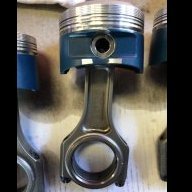Used Forged Pistons, Pics - Can I Used Them, Bore Questions
Announcements
-
Similar Content
-
Latest Posts
-
"Here's how it works: Buy a set of four Pirelli tyres." Hey I think these guys are on to something 🤣
-
By TurboTapin · Posted
Absolutely! I've been in love with them since I was a kid. I remember doing a school essay on Humvee's back in grade 5 haha. I always wanted one, but didn't have the space nor the funds. With us now looking for another larger home with a larger garage, I'll have room to park it. They have also gone down considerably in price. The US army has been phasing out Humvee's, so they're flooding the market which also brings down H1 prices. It shouldn't be a problem to drive around here, I live in the suburbs. I would absolutely not buy one if I lived in a city though. They are known to be terribly unreliable. People often swap out the original 6.2/6.5L for a more reliable Duramax. H1 and Humvee's are identical, minus the fact that the H1 has a dash and seats. It sadly also makes the H1 more expensive. I've driven both and the Humvee interior, or lack thereof makes it extremely loud and unpleasant to drive. Don't get me wrong, the H1's interior is horrendous, but at least it's present. Most do a custom interior in a Humvee which I'm also more than happy to purchase. -
Then I realised it was just a typo. I was hoping for a set of Pirellys for my 5 series.
-
Sounds like a Barra swap is needed...
-
A super responsive 250 would be nice in a daily.
-








Recommended Posts
Create an account or sign in to comment
You need to be a member in order to leave a comment
Create an account
Sign up for a new account in our community. It's easy!
Register a new accountSign in
Already have an account? Sign in here.
Sign In Now